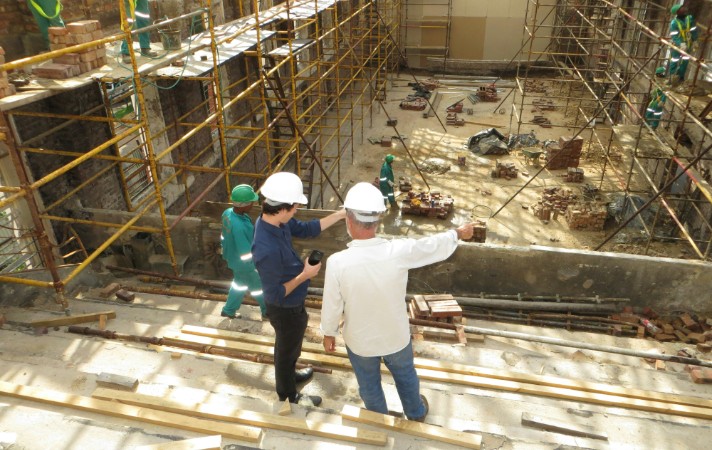Resolving property disputes in the UK can be a complex process, and it’s essential to understand the legal framework and available options.
Property disputes can give rise to emotional turmoil which can disrupt your daily life.
As solicitors who deal in commercial property law and residential property law, we have seen first-hand the problems property disputes can cause.
That is why we have put this comprehensive guide together, so you can navigate property disputes using our expert knowledge.
What is a Property Dispute?

A property dispute is when there is a disagreement or conflict between you or entities over the ownership, possession, or use of a piece of real estate.
These disputes can include a wide range of issues, including:
- Boundaries.
- Easements.
- Title disputes.
- Landlord-tenant conflicts.
- Disagreements over the right to use certain portions of the property.
Property disputes may involve residential, commercial or agricultural land.
Resolving property disputes often requires legal intervention and the process may involve negotiations, mediation or in more contentious cases, litigation.
Clear documentation, including property deeds, surveys, and contracts, is crucial in preventing and resolving property disputes.
Types of Commercial Property Disputes
Here are some common types of commercial property disputes:
Lease Disputes

Disputes over unpaid rent are common in lease agreements.
You may pursue legal action to recover the outstanding amount, and tenants may contest charges or claim that the property did not meet agreed-upon standards, justifying non-payment.
Resolving such disputes may involve negotiations, payment plans, or legal proceedings.
Violations of lease terms can include unauthorised subletting, illegal activities on the premises, or failure to comply with maintenance obligations.
You may seek eviction or damages, while tenants might defend their actions or claim landlord negligence.
Adherence to the lease agreement and clear communication are crucial for resolving such conflicts.
Disagreements may arise when negotiating lease renewals, especially concerning rent increases, changes in terms, or your refusal to renew.
Communication, understanding lease terms, and adherence to legal procedures are vital for a resolution.
Mediation or alternative dispute resolution methods can also be explored.
Tenant Improvements
Conflicts may emerge over who is responsible for specific repairs and maintenance tasks. Lease agreements should clearly outline these responsibilities.
Disputes can be resolved through mediation, legal clarification, or by establishing maintenance protocols that prevent future disagreements.
Tenants may wish to make alterations or improvements to the leased space, but disputes may arise over the scope of changes and whether they comply with the lease terms.
Negotiating a formal agreement before modifications occur can prevent conflicts.
Service Charge Disputes
Conflicts over service charges involve disagreements about the costs associated with shared facilities and services.
Transparency in the calculation and communication of service charges, adherence to lease terms and alternative dispute resolution methods can help resolve these issues.
Dilapidations
Disputes over property conditions at the end of the lease term involve disagreements on necessary repairs and associated costs.
Detailed property condition assessments and clear lease terms are crucial for addressing and resolving dilapidation claims.
Insurance Disputes

Disputes may arise concerning the interpretation and coverage of insurance policies for the property.
Insurance disputes involving subrogation claims occur when insurers seek compensation from third parties responsible for property damage.
Licence and Lease Agreements
Disputes can happen when parties disagree on the terms of licence agreements for specific areas within a property.
Conflicts over the interpretation of lease terms and conditions can also lead to disputes.
Legal guidance may be necessary to clarify ambiguous terms and ensure both parties’ understanding of their rights and obligations.
Environmental Issues
Disputes related to environmental contamination may involve disagreements over responsibility for cleanup costs.
Conflicts over compliance with environmental regulations can lead to disputes.
You may face legal consequences if found in violation.
Contractual Disputes
Conflicts may arise during the sale and purchase of commercial properties, involving issues such as misrepresentation, failure to disclose information, or disputes over contract terms.
Disputes over breaches of contracts related to commercial property transactions can encompass a range of issues.
Common types of residential property disputes

Here are some common types of residential property disputes:
Boundary and Access Disputes
Conflicts over property lines and boundaries may arise due to unclear property descriptions or changes made without proper documentation.
Resolving boundary disputes may involve surveys, legal documentation, or negotiations between property owners.
Landlord-Tenant Disputes
Eviction disputes involve legal processes to regain possession of the property.
Issues may include wrongful eviction claims, non-compliance with eviction procedures or tenant defences.
Adherence to eviction laws and clear documentation are crucial.
The return of security deposits is another issue.
Conflicts over the return of security deposits often revolve around the condition of the property and any deductions made.
Planning and Development Disputes

Disputes related to planning permission can arise when property owners seek to make changes or developments.
Challenges may involve objections from neighbours, environmental concerns or non-compliance with planning regulations.
Restrictive Covenants
Restrictive covenants in residential property law are legal agreements or conditions imposed on a property by a previous owner or a developer that limit or control how the property can be used or developed.
These covenants are designed to maintain a certain standard or preserve specific characteristics of a neighbourhood or development.
They are typically found in the property’s deed or a separate document associated with the property.
Covenants may be put in place to maintain a certain visual appeal or architectural style within a neighbourhood or development.
Party Wall Disputes
Party wall disputes arise when neighbours share a common boundary structure, such as a wall, fence or boundary line.
These disputes often involve disagreements regarding the maintenance, alterations or repairs to the shared structure.
The term “party wall” typically refers to a wall that stands on the land of two or more owners and is used by them for various purposes.
Disputes may arise when one property owner wishes to make alterations or extensions that could affect the stability or integrity of the party wall.
Conflicts can also occur when determining responsibility for the maintenance or repair of a party wall, especially if one owner believes the other is neglecting their duties.
Disagreements can happen when one owner needs access to the party wall to carry out work or inspections, and the other owner is unwilling to grant permission.
The Party Wall Act is used to help resolve any issue that may occur regarding Party Wall disputes. It applies to England and Wales but excludes Scotland and Northern Ireland.
Alternative Dispute Resolution (ADR)

Alternative Dispute Resolution (ADR) refers to methods of resolving conflicts and disputes outside the traditional court system.
ADR offers alternative avenues for parties to settle their differences with the assistance of a neutral third party.
These methods are often considered more flexible, cost-effective, and time-efficient than formal litigation.
Here’s an overview of the key ADR methods:
- Mediation – In mediation, a neutral third party, known as the mediator, facilitates communication and negotiation between the disputing parties. The mediator does not make decisions but helps the parties explore solutions and reach a mutually agreeable resolution. Mediation is generally a voluntary process, and the parties involved retain control over the outcome.
- Arbitration – In arbitration, a neutral third party, the arbitrator, acts as a private judge. The arbitrator listens to both sides of the dispute, reviews evidence, and makes a binding or non-binding decision, depending on the agreed terms. Arbitration offers more flexibility in terms of procedure and rules compared to traditional court proceedings.
Commercial and Residential Property Law Experts
Property disputes can be complex in nature and hard to resolve.
But with the right support and guidance you can get the right information needed to make the best possible case for yourself.
We’re highly experienced at giving advice and legal counsel on commercial and residential property law.
Thanks to our expert team here at Brown Turner Ross we can fully support you when it comes to property disputes.
If you’re experiencing any property disputes and need help, reach out to us.
